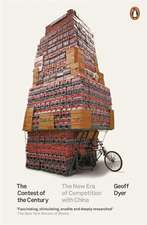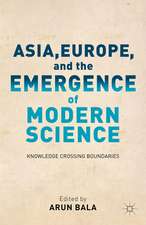Intellectual History in Contemporary South Africa
Autor M. Ezeen Limba Engleză Hardback – 18 aug 2010
Preț: 385.62 lei
Nou
Puncte Express: 578
Preț estimativ în valută:
73.79€ • 77.25$ • 61.05£
73.79€ • 77.25$ • 61.05£
Carte tipărită la comandă
Livrare economică 05-19 aprilie
Preluare comenzi: 021 569.72.76
Specificații
ISBN-13: 9780230622999
ISBN-10: 0230622992
Pagini: 220
Ilustrații: XIII, 220 p.
Dimensiuni: 140 x 216 x 18 mm
Greutate: 0.36 kg
Ediția:2010
Editura: Palgrave Macmillan US
Colecția Palgrave Macmillan
Locul publicării:New York, United States
ISBN-10: 0230622992
Pagini: 220
Ilustrații: XIII, 220 p.
Dimensiuni: 140 x 216 x 18 mm
Greutate: 0.36 kg
Ediția:2010
Editura: Palgrave Macmillan US
Colecția Palgrave Macmillan
Locul publicării:New York, United States
Cuprins
Introduction * South Africa: The Past is another country * South African (black) Nationalist ideologies and Resistance Movements * The 'prophets' and the 'Apocalypse' * When the chickens come to roost * Ubuntu: Many voices of a History * Ubuntu: A critique of Colonial/Apartheid reason? * Ubuntu and the making of South African Imaginary * Ubuntu: Towards a new public discourse * Conclusion: Towards a new humanism?
Recenzii
'Among other accomplishments in this history of political thought in South Africa, Michael Eze succeeds in transcending two major approaches often taken to ubuntu, the sub-Saharan conception of morality prominent in South African socio-political discourse. One approach is that since ubuntu was an ideal way of life in pre-colonial times, it is worth reproducing today, while the other is that since ubuntu is merely a recent construction by political elites, it has no authority to guide policy. In contrast to both, Eze convincingly argues that ubuntu was part of traditional African culture prior to colonialism, but was far from ideal, and hence is something that today's South Africans should refashion collectively. Eze's 'creative historiographical' approach to ubuntu should guide all future thinking about the topic.'
-Thaddeus Metz, Humanities Research Professor, University of Johannesburg, South Africa
-Thaddeus Metz, Humanities Research Professor, University of Johannesburg, South Africa
Notă biografică
MICHAEL ONYEBUCHI EZE is a Research Fellow at the Kulurwissenschatliches Institut, Essen, Germany and the Editor-in-Chief of The African Communitarian: A Journal of African Ethics, Social and Political Philosophy.

















